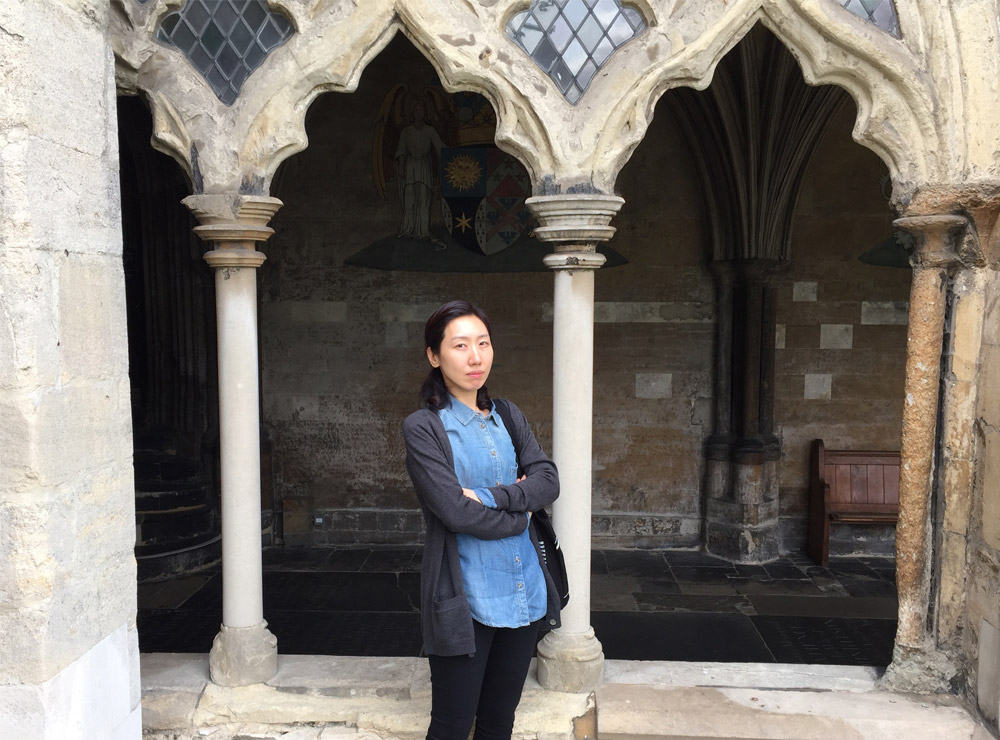
Translated by Angela Kim
My luck, my loneliness
My love affair with children’s books began in loneliness. Having left my beloved old town, where I used to play with my friends, to move to an apartment, I was lonely for a long time. Because I was introvert and clumsy, I was not good at negotiating my new environment. Slowly, I got along with people, but soon I moved to another town, and this happened again and again. And the more I moved, the lonelier I became.
Sitting in a classroom, I just wanted to go back home. I often stayed out on the veranda, looking outside. Sitting there, I could hear other children singing while they played a jump-rope game. The sunlight shone brightly on the veranda the day I realised that those children would never chant my name. I could not go out. Instead, I closed the window and fastened the lock. It was the only way to protect myself. Since then, books have been my friend.
‘Today is rainy, but tomorrow will be beautiful.’
Piling five or six books on the floor, I lay there flicking through the pages until it grew dark outside. Reading the books, my soul was quietly nourished. I didn’t hate sad stories but I preferred comedies, or stories with a happy ending. I wanted to believe that this would change one day; that I was just on my way there. It was like a weather forecast: although today was cloudy, tomorrow will be sunny. The sort of forecast that led me to understand good days existed too. Today is rainy, but tomorrow will be beautiful. Because I trusted that forecast, I could endure the rain, day after day. In retrospect, I was lucky to experience such bitter loneliness. If I had not been so lonely, I would never have loved children’s books so much.
The honesty of children’s books
The other reason I love children’s books is their intuitiveness and honesty. They have the power to make us realise that although things may be invisible, they exist: things that are inexpressible using words, but can be felt. For example, Puppy Poo by Kwon Jeong-saeng presents a vision of the sublime in a world where everybody thinks they are a lowly nobody. The story reflects its writer, who grew up in a labouring family. A story like this becomes special because the reality of the writer’s life imbues it. I think the heart of a good children’s book comes from some precious, inner part of the writer. The story’s inner truth is the world as experienced, seen and felt by the writer. This doesn’t mean that every single piece of writing should be drawn from the writer’s own experience; but in my opinion the most shining stories are those which contain something honest, something glimpsed with the writer’s own eyes, found with their own heart.
‘Standards, frames and borders are illusions imposed on me from outside.’
I have encountered such children’s books and they have enriched my mind and soul. The characters made me laugh, cry, think and become enraged. With their help, I could cast off the countless standards of value that made me feel ashamed, and accept whole-heartedly that standards, frames and borders are illusions imposed on me from outside. My hunger, which could never be satisfied by any other form of literature, has been satisfied in children’s books. For me, a good children’s book is an honest story scooped from the inner well of its writer’s being. I would like to write that kind of story.
Nourishment and satisfaction
I’m very clumsy. Sometimes being clumsy upsets me, but most of the time I think it’s lucky. It provokes me to atone for my mistakes, which brings happiness. It is good to be able to nourish your soul by reading someone else’s writing, their advice. I can keep to my own patterns, my clumsiness making them unique and different.
I believe that there is a hidden pattern as beautiful as a snow crystal inside of each person. Even the person who thinks ‘I have lived a trivial life’ has a beautiful pattern that has been shaped over decades. That pattern finds its shape through every single experience in one’s life – be they good or bad. It is authentic and precious. And it is good material for a writer, too: knowing my pattern, I can write despite my clumsiness and keep on trying to do my best. If I keep on writing, perhaps one day I shall grow into a green story-tree, writing stories that quietly cast their fresh shade over the children playing outside.
Download this article in the original Korean here
Residency supported by the Arts Council of Korea








